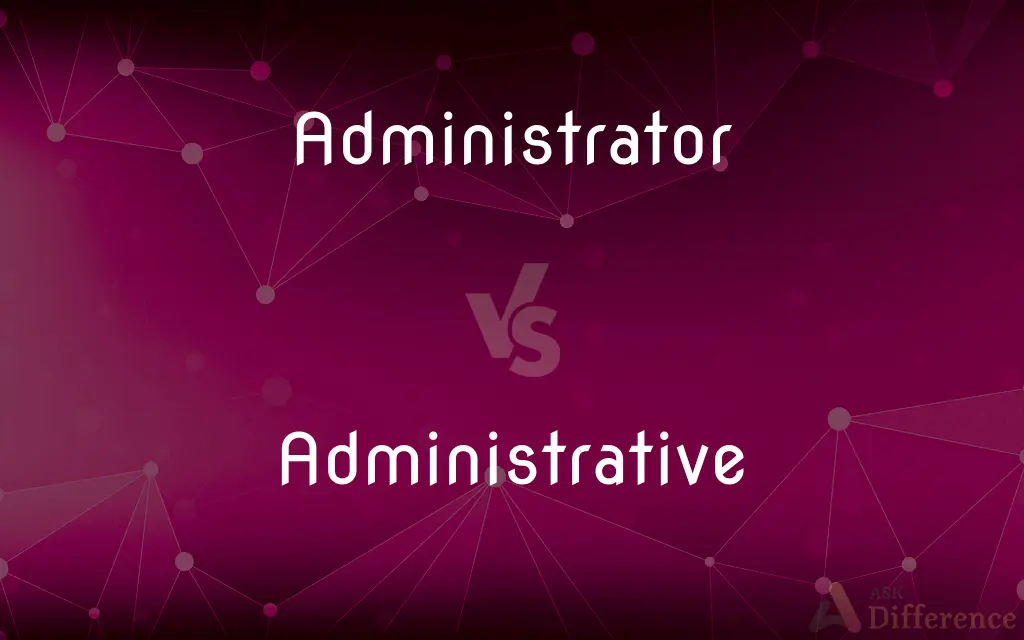Administrator vs. Administrative — What's the Difference?
By Tayyaba Rehman & Maham Liaqat — Updated on March 5, 2024
An administrator focuses on leading and managing systems or organizations, while administrative pertains to the tasks and processes that support an organization's functioning.

Difference Between Administrator and Administrative
Table of Contents
ADVERTISEMENT
Key Differences
Administrators are typically individuals in positions of authority who oversee the operations and management of organizations or systems. They make decisions, manage resources, and are responsible for the success of their domain. On the other hand, administrative refers to the nature of the work or tasks that support an organization's functioning, such as clerical duties, record-keeping, and other support services.
While administrators may engage in strategic planning and decision-making, administrative tasks are more about implementing these decisions and ensuring the day-to-day operations run smoothly. Administrative work often involves organizing information, managing correspondence, and supporting the administrative needs of higher-level staff.
Administrators often hold leadership roles and may have a team of staff performing administrative tasks under their guidance. In contrast, those who perform administrative work usually do not have the same level of authority or responsibility for decision-making within the organization.
The role of an administrator is critical for setting the direction and goals of an organization, whereas administrative tasks are essential for the practical aspects of achieving those goals. Without effective administration, an organization's strategic plans may not be successfully implemented.
Administrative work is characterized by attention to detail, organizational skills, and the ability to manage multiple tasks efficiently. Meanwhile, effective administrators possess leadership qualities, strategic thinking, and the ability to oversee complex operations.
ADVERTISEMENT
Comparison Chart
Definition
An individual in charge of managing systems or organizations.
Relating to the tasks that support an organization's operations.
Key Focus
Leadership and decision-making.
Support and facilitation of operations.
Typical Tasks
Strategic planning, resource allocation, overseeing operations.
Organizing information, managing correspondence, record-keeping.
Required Skills
Leadership, strategic thinking, management.
Organizational skills, attention to detail, multitasking.
Role in Organization
High-level, with authority over staff and strategic direction.
Supportive, ensuring smooth operation of day-to-day activities.
Compare with Definitions
Administrator
A person who has been appointed to settle an estate.
The estate administrator worked diligently to settle all claims.
Administrative
Pertaining to the tasks of managing and organizing information.
She handled all the administrative work for the office.
Administrator
A person responsible for running a business, organization, or plan.
The administrator decided to implement a new management software.
Administrative
Relating to the running of a business or organization.
They implemented new administrative procedures to enhance efficiency.
Administrator
A person in an educational institution who manages operations.
The school administrator introduced new teaching methods.
Administrative
Associated with support services within an organization.
The administrative staff organized a successful team-building event.
Administrator
An individual who oversees the execution of policies.
The administrator enforced new company policies to improve workflow.
Administrative
Involving the organization of people and resources.
His role involves several administrative duties, including scheduling.
Administrator
Someone who manages affairs of a system or organization.
As an administrator, she reviews all department budgets annually.
Administrative
Connected with the execution of policy or strategy.
Administrative decisions are often made behind closed doors.
Administrator
A person responsible for carrying out the administration of a business or organization
Hospital administrators
Administrative
The act or process of administering, especially the management of a government or large institution.
Administrator
A person who dispenses or administers something
Administrators of justice
Administrative
The activity of a government or state in the exercise of its powers and duties.
Administrator
One who administers, especially one who works as a manager in a business, government agency, or school.
Administrative
The group of people who manage or direct an institution, especially a school or college.
Administrator
One who administers affairs; one who directs, manages, executes, or dispenses, whether in civil, judicial, political, or ecclesiastical affairs; a manager
Administrator
(legal) A person who manages or settles the estate of an intestate, or of a testator when there is no competent executor; one to whom the right of administration has been committed by competent authority
Administrator
Someone who administers a business
Common Curiosities
Can an administrator perform administrative tasks?
Yes, administrators may perform administrative tasks, especially in smaller organizations, but their primary focus is on management and decision-making.
Is administrative work only clerical?
While administrative work includes clerical tasks, it also encompasses a broader range of support activities that facilitate the smooth running of an organization.
What is the primary role of an administrator?
The primary role of an administrator is to oversee and manage the operations and strategic direction of an organization or system.
What are administrative tasks?
Administrative tasks include organizing information, managing correspondence, record-keeping, and supporting the administrative needs of an organization.
What skills are important for administrative work?
Important skills for administrative work include organizational skills, attention to detail, and the ability to manage multiple tasks efficiently.
Can someone be both an administrator and perform administrative tasks?
Yes, especially in smaller organizations, an individual may hold an administrative role while also handling various administrative tasks.
How do administrators contribute to an organization?
Administrators contribute by setting the strategic direction, making decisions, and managing resources to ensure the organization's success.
Are administrative skills only necessary for administrative roles?
No, administrative skills are valuable in many roles as they involve organization, planning, and effective communication.
What distinguishes an administrative role from other roles in an organization?
An administrative role is characterized by its focus on support and facilitation of operations, unlike roles focused on production, sales, or strategic development.
How do administrative tasks support the goals of an organization?
Administrative tasks support the goals of an organization by ensuring that the day-to-day operations are efficient, which allows for the successful implementation of strategic plans.
Share Your Discovery

Previous Comparison
Shale vs. Clay
Next Comparison
Heartache vs. HeartbreakAuthor Spotlight
Written by
Tayyaba RehmanTayyaba Rehman is a distinguished writer, currently serving as a primary contributor to askdifference.com. As a researcher in semantics and etymology, Tayyaba's passion for the complexity of languages and their distinctions has found a perfect home on the platform. Tayyaba delves into the intricacies of language, distinguishing between commonly confused words and phrases, thereby providing clarity for readers worldwide.
Co-written by
Maham Liaqat














































